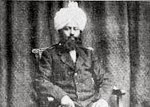The Quresh kept a vigil around the house of the Prophet. They were waiting to lay their swords on him. The Prophet asked Ali to sleep in his bed. He then departed. The Quresh did not expect that he would leave so early. They were hardly aware of him when he went out from their midst. He met Abu Bakr, waiting on the way, as arranged before. Both made for the cave Saur, a cosy hide-out three miles south of Mecca. The Quresh found Ali in the Prophet's bed. They were mad with anger and beat him mercilessly. The placed a reward of 100 camels for any one who would bring Muhammad back dead or alive. Many men set out to win the prize. The search grew hot. The Quresh soon reached the mouth of the cave. They found a spider's web across it. They also found a pigeon's nest on a branch of the tree that shaded the cave. The guide of the Quresh said,
"Muhammad is either in the cave or has gone up to the heaven."
Nobody looked down into the cave. The Prophet and Abu Bakr could see the men outside. They could see their feet. Abu Bakr felt afraid on account of the Prophet. He spoke out his fear to him. The Prophet said,
"Fear not. For surely Allah is with us both."
The Prophet and Abu Bakr left the cave after three days. On the way they were overtaken by one Suraqa bin Malik. He was pursuing them on horseback. His mount stumbled three times. Suraqa took fright at this and, calling them, sought peace. He told them that he had come to win the reward set on their heads. But, he said, he had changed his mind. He then rode back. The Prophet said to him,
"O Suraqa, how will you feel with the bangles of Hormoz on your wrists?"
"Hormoz, the Emperor of Iran?"
asked Suraqa.
"Yes,"
said the Prophet. Suraqa stood rooted to the spot in utter amazement.
After a hard journey of eight days, the Prophet reached Yasreb. It was the 20th day of September 622. The people of the town had learnt of his departure from Mecca. There were expecting him. They kept turning out en masse for several days to receive him. One day a Jew espied from his house a party dressed in white. He shouted at the top of his voice:
"O people of Arabia, there comes the man you have been waiting to see."
Soon the whole of Yasreb resounded with the cries of Allah-o-Akbar (Allah is great). Big crowds rushed to welcome the Prophet. They went wild with joy. Yasreb had never been so happy before. The Prophet then proceeded to Quba. Kalsum bin Alhadam, chief of the place, gave him a big welcome there. The Prophet put up at his house. The first thing he did there was to build a mosque. It was called Masjid-i-Quba.
Yasreb was now called Madina-tul-Nabi, the city of the Prophet. Muslims of Medina were called Ansars (helpers). And the refugee Muslims were called Muhajirs. Every Ansar family wanted the Prophet to stay with them. He chose to put up with Banu Najjar, the relations of his grandfather Abdul Muttalib.
After about ten days, the Prophet moved from Quba mounted on the back of a camel. Ansars and Muhajirs followed him. On the way he stopped for Juma - Friday congregational prayers. From that day, Juma prayer has become a regular weekly worship in Islam. On the way to Medina proper the Prophet was warmly greeted by groups of Ansars. Women and little girls sang with joy.
"The full moon has arisen on us from the top of mount Vida.
It is our duty now to give thanks to God."
When he reached the quarter of Banu Najjar, the girls chanted merrily.
"We are the girls of Banu Najjar.
How good the Prophet will be our neighbour."
Now the question was where the Prophet would stay. He said his she-camel would sit where God wished him to stay. The animal sat down in an open space. The Prophet dismounted and asked,
"Who lives near here?"
Abu Ayub Ansari came forward saying,
"O Prophet of Allah, this is my house and this is my door, pray step in."
The Prophet stayed there for seven months. Abu Ayub Ansari and Saad bin Obada served him meals and felt greatly honoured for it.
Soon after his arrival in Medina, the Prophet sent Zaid bin Haris to Mecca to fetch his family. After a few days he returned with members of the Prophet's household. Ali reached Medina three days after Prophet's arrival.
The Prophet bought the land where his she-camel had stopped and where he had dismounted. Here he built the Masjid Nabavi, the Prophet's mosque and a one room house for himself. In one corner he built a shed or suffa for the poor refugees, the Muhajirs. They were without means. The Prophet provided victuals, often starving himself to feed them. The Ansars brought them dates and other eatables. They lived a life of prayer and devotion. They kept the Prophet's company day and night.
The Prophet's mosque was his court, his prayer-hall, and his council room. Here he trained soldiers and here he kept his prisoners of war. Here he received embassies.
The call to prayer was simple in the beginning. Later the present Azan became the call for the five daily prayers and Bilal, an African convert, became the first Moazzin (caller). The Prophet gave the first place to prayer in all the duties. This, he said, was the badge of a Muslim, which distinguished him from others and led the faithful to the summit of true felicity.
 Blog RSS Feed
Blog RSS Feed Via E-mail
Via E-mail Twitter
Twitter Facebook
Facebook
























0 comments:
Post a Comment
Note: Only a member of this blog may post a comment.